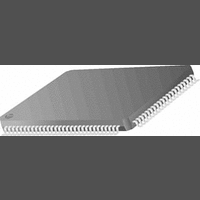DS90CR483VJD National Semiconductor, DS90CR483VJD Datasheet - Page 18

DS90CR483VJD
Manufacturer Part Number
DS90CR483VJD
Description
IC, LVDS CHANNEL LINK SER/DES, TQFP-100
Manufacturer
National Semiconductor
Datasheet
1.DS90CR483VJD.pdf
(22 pages)
Specifications of DS90CR483VJD
Supply Current
280mA
Supply Voltage Range
3V To 3.6V
Driver Case Style
TQFP
No. Of Pins
100
Operating Temperature Range
-10°C To +70°C
Device Type
Clock
Termination Type
SMD
Filter Terminals
SMD
Rohs Compliant
No
Data Rate Max
5380Mbps
Lead Free Status / RoHS Status
Contains lead / RoHS non-compliant
Available stocks
Company
Part Number
Manufacturer
Quantity
Price
Company:
Part Number:
DS90CR483VJD
Manufacturer:
NS
Quantity:
26
Company:
Part Number:
DS90CR483VJD
Manufacturer:
Texas Instruments
Quantity:
10 000
Company:
Part Number:
DS90CR483VJD/NOPB
Manufacturer:
National Semiconductor
Quantity:
135
Company:
Part Number:
DS90CR483VJD/NOPB
Manufacturer:
Texas Instruments
Quantity:
10 000
Company:
Part Number:
DS90CR483VJDX
Manufacturer:
Texas Instruments
Quantity:
10 000
Company:
Part Number:
DS90CR483VJDX/NOPB
Manufacturer:
Texas Instruments
Quantity:
10 000
www.national.com
TxIN
TxOUTP
TxOUTM
TxCLKIN
TxCLKP
TxCLKM
PD
PLLSEL
PRE
DS_OPT
BAL
V
GND
PLLV
PLLGND
LVDSV
LVDSGND
NC
DS90CR483 Pin Description—Channel Link Transmitter
Note 11: Inputs default to “low” when left open due to internal pull-down resistor.
Note 12: The PLL range shift point is in the 55 - 68 MHz range, typically the shift will occur during the lock time. For 65-70 MHz applications, the DS90CR481/2
is recommended since its shift point is below its operation range. See Applications Information section.
CC
CC
Pin Name
CC
I/O
O
O
O
O
I
I
I
I
I
I
I
I
I
I
I
I
I
TTL level input. (Note 11).
Positive LVDS differential data output.
Negative LVDS differential data output.
TTL level clock input. The rising edge acts as data strobe.
Positive LVDS differential clock output.
Negative LVDS differential clock output.
TTL level input. Assertion (low input) tri-states the outputs, ensuring low current at
power down. (Note 11).
PLL range select. This pin should be tied to V
NC will force the PLL to low range only. Typical shift point is between 55 and 68
MHz for auto-range. (Notes 11, 12)
Pre-emphasis “level” select. Pre-emphasis is active when input is tied to V
through external pull-up resistor. Resistor value determines Pre-emphasis level (See
Applications Information Section). For normal LVDS drive level (No Pre-emphasis)
leave this pin open (do not tie to ground).
Cable Deskew performed when TTL level input is low. No TxIN data is sampled
during Deskew. To perform Deskew function, input must be held low for a minimum
of 4 clock cycles. The Deskew operation is normally conducted after the TX and RX
PLLs have locked. It should also be conducted after a system reset, or a
reconfiguration event. It must be performed at least once when "DESKEW" is
enabled. (Note 11) Deskew is only supported in the DC Balance mode (BAL =
High).
TTL level input. This pin was previously labeled as V
Balance function. But when tied low or left open, the DC Balance function is
disabled. Please refer to (Figures 15, 16) for LVDS data bit mapping respectively.
(Note 11), (Note 14)
Power supply pins for TTL inputs and digital circuitry. Bypass not required on Pins
20 and 21.
Ground pins for TTL inputs and digital circuitry.
Power supply pin for PLL circuitry.
Ground pins for PLL circuitry.
Power supply pin for LVDS outputs.
Ground pins for LVDS outputs.
No Connect. Make NO Connection to these pins - leave open.
18
Description
CC
for auto-range. Tied to ground or
CC
, which enabled the DC
CC











